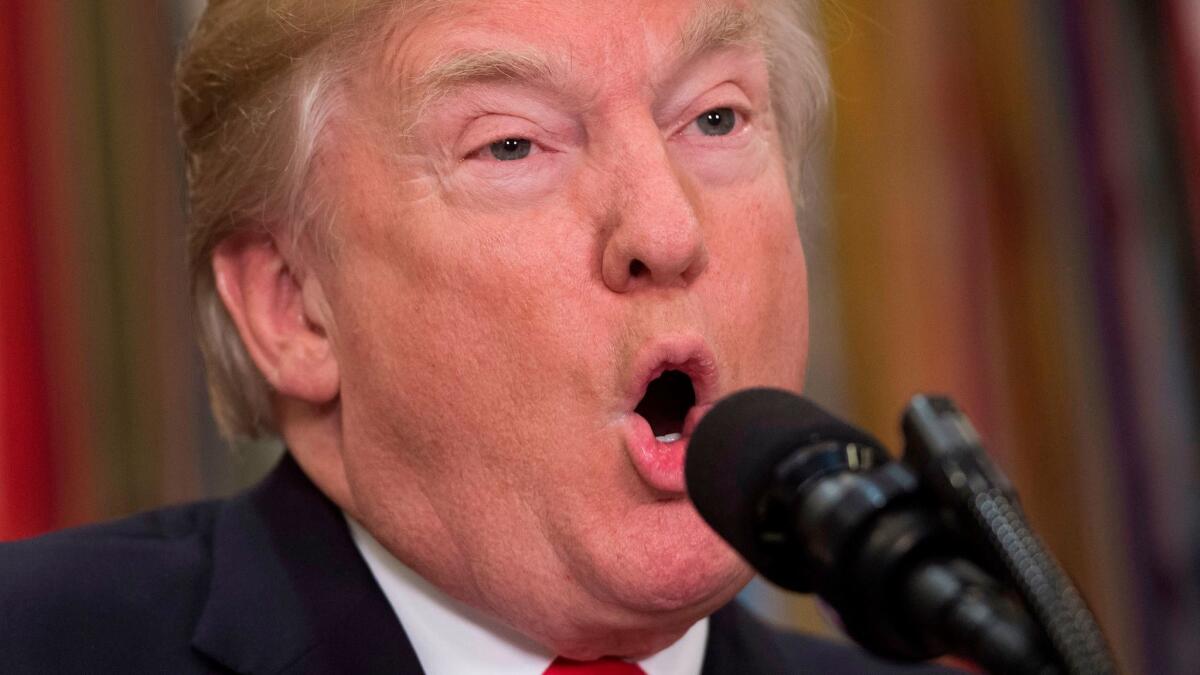Op-Ed: Trump’s every tweet shouldn’t dominate the news cycle, but his blather demands confrontation

- Share via
As year two of the Trump administration begins, a workaround has emerged to deal with the president’s mercurial rantings: Ignore them, deny them or try to wish them away.
At first, Sens. Tom Cotton and David Perdue merely “did not recall” the president using a much-reported vulgarity in a White House meeting; then they were certain it had never happened. The head of the White House Correspondents’ Assn., Margaret Talev, has dismissed Trump’s persistent denigrations of the press as “rhetoric” and says her organization won’t react to threats unless they are backed by action. White House Chief of Staff John F. Kelly claims he does not follow the president’s tweets, nor does he allow other aides to do so. In October, House Speaker Paul D. Ryan urged the public to do the same: “All this stuff you see on a daily basis, on Twitter this and Twitter that — forget about it.” When Trump had an attorney pledge to sue the author and publisher of “Fire and Fury:Inside the Trump White House,” many observers dismissed it as empty legal saber-rattling, another bullying bluff.
The desire to play down the president’s tirades is understandable: His unscripted utterances, tweets and threats tend toward the gratuitous, unfounded and confounding. The impulses that drive them seem to evaporate long before the retweeting is done. That Trump cannot be taken at his word, however, doesn’t render his words inconsequential. The incontrovertible fact that he is president gives his pronouncements potency independent of their veracity, or the intent and actions of the man doing the talking. Declining to credit what he says doesn’t neutralize its power.
The only thing more dangerous to the United States than taking the president at his word would be a collective decision to no longer do so.
One essential reason we are not at liberty to ignore Trump’s words is that others won’t or can’t. Readers of the Los Angeles Times may dismiss his self-serving rants, but the president’s core supporters believe him when he calls CNN or the New York Times fake news. The mistrust he has sown has helped drive record low public perceptions of the media, fortifying Trump’s hard-line supporters inside a bunker that can’t be penetrated by facts or reason. Employees of the federal government also don’t have the luxury of ignoring the boss. In a November filing, attorneys from the Department of Justice told a federal court that the president’s tweets are treated as official statements.
In foreign capitals around the world, other nations’ leaders and officials are rightly hesitant to disregard Trump’s statements, no matter how baseless. Given the United States’ economic and military might, any chance that the president is serious about, for example, his baiting of North Korean leader Kim Jong Un or his contempt for NATO demands that foreign governments react. And because international leaders must factor Trump’s pronouncements about them into policymaking, his musings can change facts on the ground when it comes to the health of the trans-Atlantic partnership or the fate of the Korean peninsula.
Dismissing Trump’s rhetoric carries another risk. As in the fable of the boy who cried wolf, sometimes he really means it. Some of his assertions are every bit as deliberate and consequential as presidential pronouncements used to be. He has made good on pledges to cut aid to Pakistan and to repudiate long-standing U.S. policy on Israel’s capital. Trump’s unpredictability renders the boundary between serious and spurious virtually indiscernible at the time his remarks are made. Nothing he says can be taken for its plain meaning, nor can anything be disregarded as definitively meaningless.
Some analysts have argued that the structure of our federal government, with its strong institutions and checks and balances, offers protection against the gale force of contradictory and radical presidential talk. By this logic an irrational and unreliable president could gradually be relegated to the margins of policymaking, or even impeached. So far, though, the required quorum of government officials hasn’t emerged to safeguard the republic.
The president’s brazen falsehoods about the implications of the new tax law for the middle class, the wealthy and even for Trump himself were lapped up by Republican lawmakers hungry for a legislative win. Rather than excoriating Trump for threatening to ban “Fire and Fury,” congressional Republicans rejoiced that the president’s outrage led to the ouster of antagonist Stephen K. Bannon. When Trump’s tirades serve their interests, his accomplices play along, to the point of lying if necessary to quell a crisis.
To refuse to dismiss Trump’s bloviating does not mean that his every tweet should dominate the news cycle. Trump’s blather — however incendiary or inopportune — demands confrontation. This means vociferously defending the truth, calling out falsehoods, decrying recklessness, standing up for the victimized and countering absurdity with reason. The idea that Trump’s folly will eventually collapse under its own weight itself collapsed on the day he was elected president.
That citizens, pundits and even his own chief of staff have often decided to tune out President Trump may help blunt the force of his most ill-conceived pronouncements. But denying the power of the presidential bully pulpit brings with it a weakening of the U.S. presidency as a whole, an impairment that may well outlive Trump’s tenure. The only thing more dangerous to the United States than taking the president at his word would be a collective decision to no longer do so.
Suzanne Nossel is the executive director of PEN America.
Follow the Opinion section on Twitter @latimesopinion and Facebook
More to Read
A cure for the common opinion
Get thought-provoking perspectives with our weekly newsletter.
You may occasionally receive promotional content from the Los Angeles Times.






